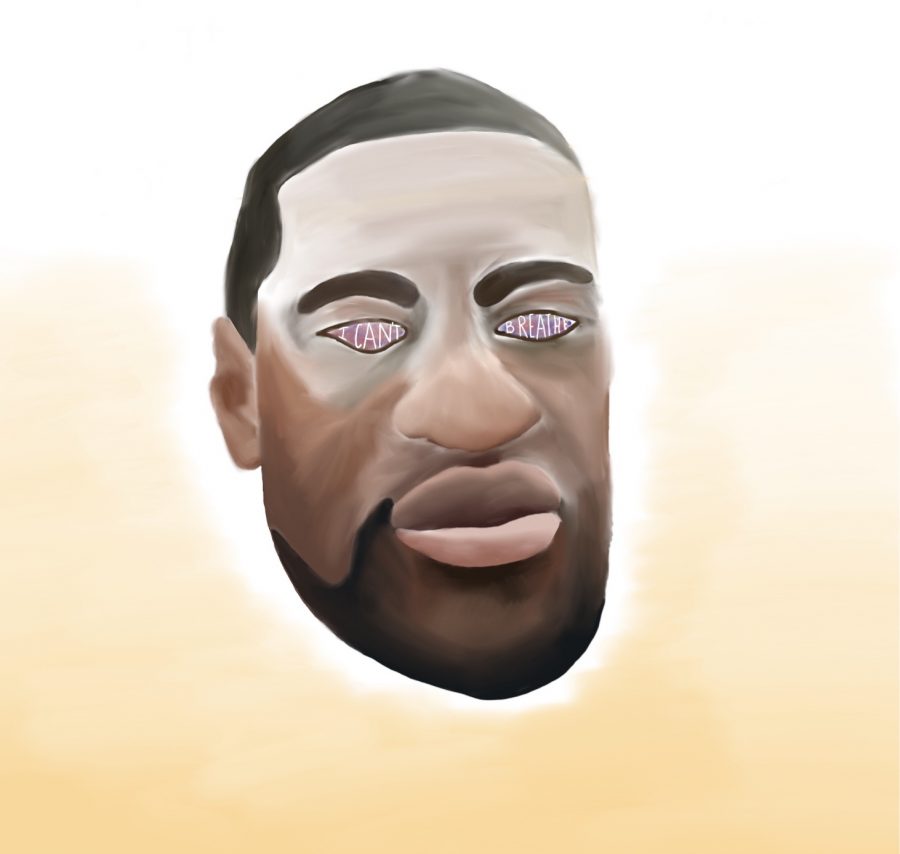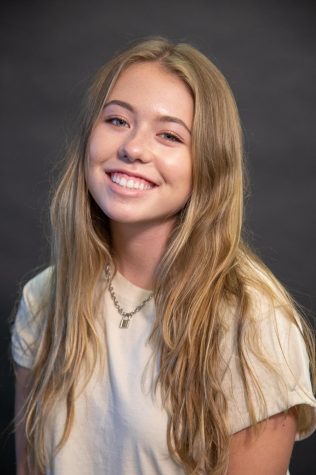Death of George Floyd, Instagram Activism and Protests Cause Reactions Among Students
A portrait of George Floyd, a black man who died on May 25 while a white police officer was kneeling on his neck. Protests have erupted across the nation, and recently around the globe, in response to the incident and the injustices it represents. Staff illustration: Lauren Lawson.
June 2, 2020
George Floyd, a 46-year-old black man, died while white police officer Derek Chauvin held pressure on his neck with his knee on Monday, May 25 in Minneapolis, Minn. In video footage from the incident, Chauvin kneels on Floyd’s neck and Floyd says, “I can’t breathe, man. Please let me stand.” His death is one of many incidents involving police brutality against black people, others including Ahmaud Arbery, Breonna Taylor and Eric Garner, whose death in 2014 involved the same phrase, “I can’t breathe”.
All four officers were fired on Tuesday and Chauvin is now in custody, facing charges for third degree murder and manslaughter. Chauvin had his knee on George Floyd’s neck for nearly nine minutes, including after he became unresponsive for two minutes and 53 seconds, according to The New York Times. Nationwide protests have commenced, and social media is in uproar.
Senior Ayinde Olukotun told The Coat of Arms that he has three uncles who have each been held at gunpoint by a police officer on separate occasions. He also said that though he wishes it wasn’t true, his mother first told him not to wear a hood unless it was pouring rain when he was eight years old. “I think it’s eye-opening to see people on social media [who still say], ‘I’m shocked.’ At one point, the outrage is nothing but ignorance. It’s not outrageous, it’s normal. The outrage needs to turn into political movement and policy change,” he said.
Many students have been posting on their Instagram stories about the issue. Olukotun sees this as “slacktivism.” “At Menlo, we’ve had no shortage of racist incidents, and [now] people who are silent when racism occurs in their immediate lives and who do not stand up for people of color […] are posting on social media because of social pressure. It’s definitely important that people post to raise awareness when the incident first occurs. [Instagram activism] may be birthed from a place of good intention, but trivializing people’s lives to such an extent is never okay,” Olukotun said.
Sophomore Sammie Floyd also said that some of the Instagram posts are shallow. “It seems for most of the Menlo community, the whole Black Lives Matter movement is performative. They’re saying #BlackLivesMatter and then going back to their bedrooms and singing the n-word in rap songs,” she said.
Sammie Floyd first found out about the death of George Floyd when she saw a repost of the footage from the incident. “At first, I didn’t feel anything. I think that […] our generation is so desensitized to horrific things that are happening. But seeing the lack of emotion of the cops in the video brought emotion out in me,” she said.
Senior Mara Lebovitz has posted multiple times on Instagram, calling her followers to action. She emphasized the importance of electing candidates that take these issues seriously, as well as the detriment of #BlackOutTuesday. Today, people posted blank, black screens as a way to advocate for the Black Lives Matter movement, but Lebovitz said that when people use the hashtags #BlackLivesMatter and #BLM, Instagram categorizes those posts with the important information and evidence. “The black screen isn’t inherently negative, it’s that the screens covered all the information that was previously on the Black Lives Matter hashtag,” she said.
Lebovitz also talked about the downside of #BlackOutTuesday from an activism perspective. “[For] a lot of people, the first thing they said on this matter publicly was just posting a black screen. To me, if the only day you choose to say something is on the day [when] you’re literally just supposed to post a black screen, then your activism is merely performative,” she said.
However, she disagrees that all social media activism is performative. “In our generation, social media is the biggest power that we hold. That being said, activism should never stop with social media,” she said.
Lebotvitz also talked about how LGBTQ+ rights were positively impacted by riots, referencing the Stonewall riots. “We need to show up for the Black Lives Matter movement just as much as we show up for Pride,” she said.
She believes that as a white person, it is not her place to tell black people how to express their anger. “Whatever I think doesn’t matter because I’m not black. I’m not the ones whose communities are being torn to pieces by police in this country. [At] this moment, white people are supposed to be allies, to amplify black voices and [to] protect black people because our white bodies are our privilege,” she said.
Senior Sydney Bianchi has been interning for The Truth Telling Project, a non-profit organization dedicated to combating structural violence, since her junior year. She continued her work through an IP Project about police brutality, where she held presentations, led fundraisers and brought in a speaker named Uncle Bobby X, who is an activist and leader of the social justice organization Love Not Blood Campaign.
Bianchi said these cases of police violence have brought a lot of national attention to people who were not previously focused on the issue of racism in the U.S. “I think it’s a chance [for people] to learn and get involved, but some people just use their platforms [because Black Lives Matter activism is] trending. At Menlo, [people are silent when incidents occur] in the classroom all the time, so I hope this can be the moment of shock and change [when] we drop the complicit habits and keep fighting for justice after #BLM stops trending,” Bianchi said.
She suggested that people sign petitions, educate themselves, peacefully protest, do phone calls and attend Diversity, Equity and Inclusion (DEI) workshops, which are led by Chief of Institutional Equity, Diversity, and Inclusion Keith Wheeler. “I’m a huge believer in dedicating yourself to purposes larger than [yourself]. It’s hard to engage in work that may not directly affect you, but it’s important to understand the struggles of people you may not seem to relate to on a surface level,” she said.
Protests, some of them violent, have erupted in over 75 U.S. cities, according to CNN. In San Jose on Friday, May 29, protesters shut down Highway 101. That same day in San Jose, the protests escalated and a protester began punching an officer, though they were quickly taken into custody, according to ABC News. After protesters didn’t comply with officers ordering them to disperse, the police started to use rubber bullets, tear gas and flash-bangs, which are explosives designed to disorient people.
“When you hear stories about stealing from Target, blocking traffic and even destroying property, there is no difference compared to decades and decades of police brutality and extra-judicial murder. Looting Target does not come close to the issue of systematic racism,” Olukotun said.
Sammie Floyd talked about the current protests through a historical lens. “Peaceful protests for Black Lives Matter have not worked. Colin Kaepernick took a knee in the NFL and lost his career. I think this generation is more of a Malcolm X generation. The Boston Tea Party, the American Revolution, the Stonewall riots — none of those were peaceful, and all of them brought major changes,” she said.




